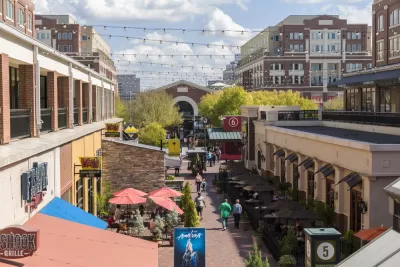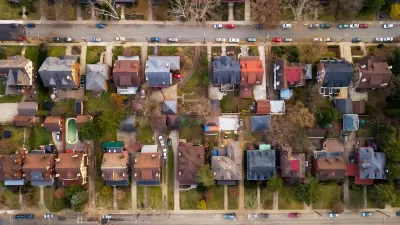The "Atlanta City Design: Housing" initiative is one of the most ambitious planning reform efforts of any large U.S. city, but it's just getting started.

Rebecca Bellan explores the potential of Atlanta's recent efforts to tackle housing affordability to end single-family zoning in the quickly growing city.
Inspiring the discussion is the city's "Atlanta City Design: Housing" (ACDH) initiative, announced at the end of 2020 by Mayor Keisha Bottoms as part of the city's One Atlanta Housing Affordability Action Plan. The City Design initiative promises policy reforms, i.e., zoning changes, to lower housing prices in the city.
The headline of Bellan's coverage focuses on whether the nascent initiative could achieve the sort of comprehensive reform, ending single-family zoning entirely, achieved by a relatively small number of cities and states in recent years, but the article goes into a lot more detail about the realities of land use policy and race in the city. The article provides a lot of detail about the initiative will work. So, for example:
The ACDH project breaks down the city into “growth areas” and “conservation areas” based on the physical nature of Atlanta. Growth areas represent the city’s densest locales that are ripe for further urban development. Conservation areas make up a larger portion of the city and include low-density residential regions and green space. To maintain the form and character of these neighbourhoods, “subtle” density could be added, which looks very different from building apartment buildings or other multifamily dwellings.
Among the policies that could be reformed through this process, Bellan lists accessory dwelling units, parking requirements, and urban enterprise zones, among others.
FULL STORY: Can Atlanta end single-family zoning?

Manufactured Crisis: Losing the Nation’s Largest Source of Unsubsidized Affordable Housing
Manufactured housing communities have long been an affordable housing option for millions of people living in the U.S., but that affordability is disappearing rapidly. How did we get here?

Americans May Be Stuck — But Why?
Americans are moving a lot less than they once did, and that is a problem. While Yoni Applebaum, in his highly-publicized article Stuck, gets the reasons badly wrong, it's still important to ask: why are we moving so much less than before?

Research Shows More Roads = More Driving
A national study shows, once again, that increasing road supply induces additional vehicle travel, particularly over the long run.

Judge Halts Enforcement of Anti-Homeless Laws in Grants Pass
The Oregon city will be barred from enforcing two ordinances that prosecute unhoused residents until it increases capacity and accessibility at designated camping sites.

Advancing Sustainability in Los Angeles County Schools
The Los Angeles County Office of Education’s Green Schools Symposium brings together educators, students, and experts to advance sustainability in schools through innovative design, climate resilience strategies, and collaborative learning.

Using Old Oil and Gas Wells for Green Energy Storage
Penn State researchers have found that repurposing abandoned oil and gas wells for geothermal-assisted compressed-air energy storage can boost efficiency, reduce environmental risks, and support clean energy and job transitions.
Urban Design for Planners 1: Software Tools
This six-course series explores essential urban design concepts using open source software and equips planners with the tools they need to participate fully in the urban design process.
Planning for Universal Design
Learn the tools for implementing Universal Design in planning regulations.
City of Moreno Valley
Institute for Housing and Urban Development Studies (IHS)
City of Grandview
Harvard GSD Executive Education
NYU Wagner Graduate School of Public Service
City of Cambridge, Maryland
Newport County Development Council: Connect Greater Newport





























